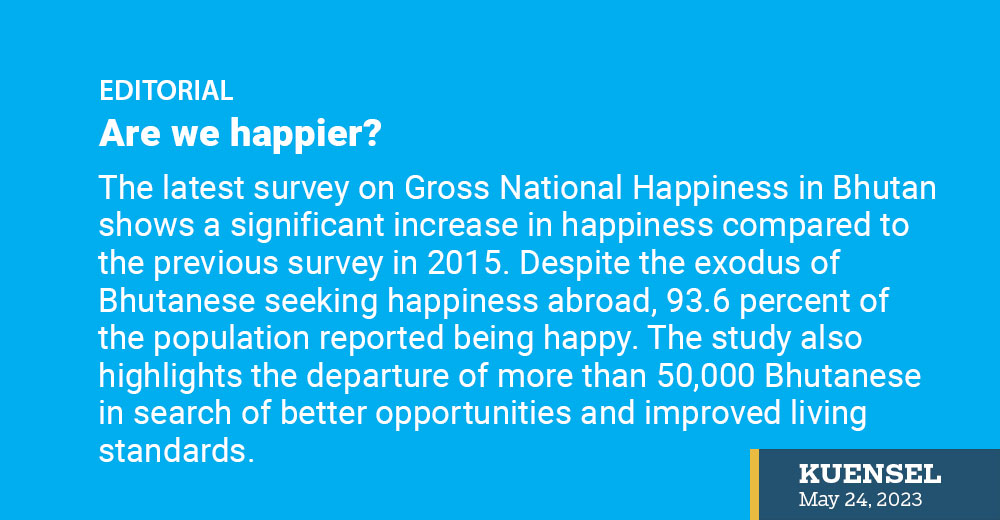The latest survey on Gross National Happiness reveals that we are happier than in the last survey, which took place eight years ago in 2015. According to the survey report launched on May 22, 93.6 percent of Bhutanese people are happy. This is an increase of 3.3 percent from 2015.
This is indeed impressive, considering the expectation that there would be many unhappy Bhutanese. Much has changed since the last survey, and it is reassuring to know that we are happier now, especially considering the exodus of Bhutanese people seeking happiness outside the country.
A study by the same center revealed that more than 50,000 Bhutanese have left the country and have not returned since the last survey in 2015. Based on what those who have left or are considering leaving say, they are in search of better opportunities for a decent, if not improved, standard of living. They had to look beyond Bhutan to find that.
The increase in GNH can be attributed to improvements in various areas such as housing, income, schooling, services, literacy, and positive emotions. It is unclear if the survey took the migration factor into consideration, but it is certain that many people are unhappy for various reasons, leading them to leave the country. Will another study in five years or sooner show a similar improvement? Only time will tell.
The GNH philosophy is based on the principle that economic growth is not the most important yardstick for measuring progress. Other factors like time use, community vitality, health, psychological well-being, and living standards are also important. Many argue that all these indicators can be found in cities like Perth, Brisbane, or Canberra in Australia. However, some agree that money cannot buy happiness and that they long to return home.
According to the survey, we are happier. However, this should not be a reason to rest on the laurels of the happiness report. For instance, the Prime Minister expected a drop in the happiness level due to recent events. The Covid-19 pandemic has disrupted lives, affected livelihoods, and the economy is still in the process of recovery. For many, obtaining a visa to Australia is seen as the ultimate goal.
From a wealthy businessman in Thimphu to a farmer in Lauri, being able to send a child or a relative to Australia brings happiness, at least for now. Not long ago, securing a job in the civil service was the dream, but today, leaving the service for Australia is considered happiness, even if it is short-lived or not the kind of happiness we longed for.
The happiness index will change every year or with each survey. There are factors that will influence the results. What we should be concerned about is what the study has highlighted.
Having been known for our unique culture and traditions for so long, it is worth noting the decline in the indices of cultural participation and the perception of Driglam Namzha. When a society’s value systems are increasingly disregarded, there is a serious problem. Driglam Namzha was a concern highlighted in the last survey, and it will likely be a concern in future studies as well because we are undergoing transformation, and the values we once cherished are now being scrutinized.
We cannot expect a teenager not to challenge or disagree with a teacher when we are teaching them the importance of dissent or discourse. Parents who try to convey the struggles they faced in their own childhood, like walking to school or absence of the internet, are often shocked by their children’s response. Frequently, the children will claim it was not their fault.
The old order changeth, it is said, making way for the new. How do we cope with change and ensure that most of us are happy?


